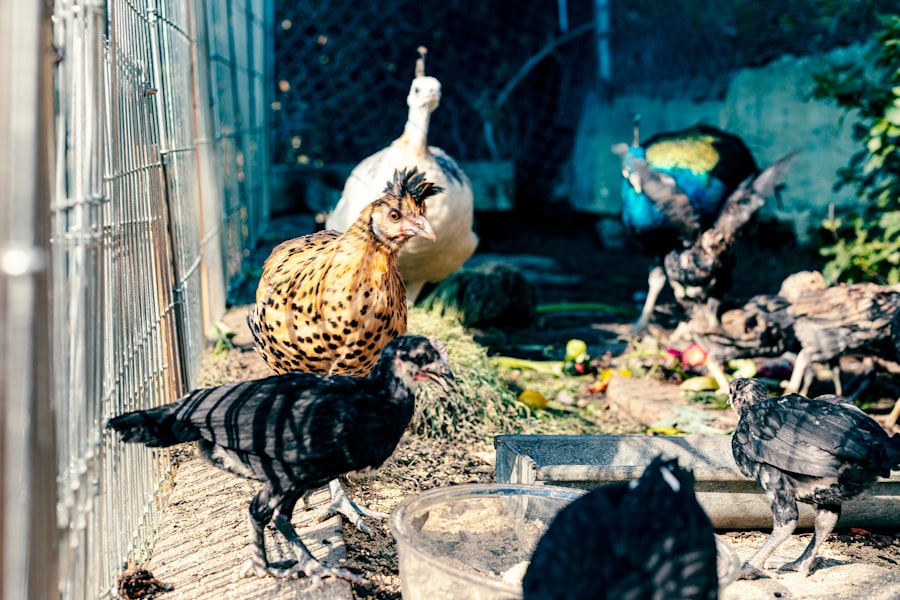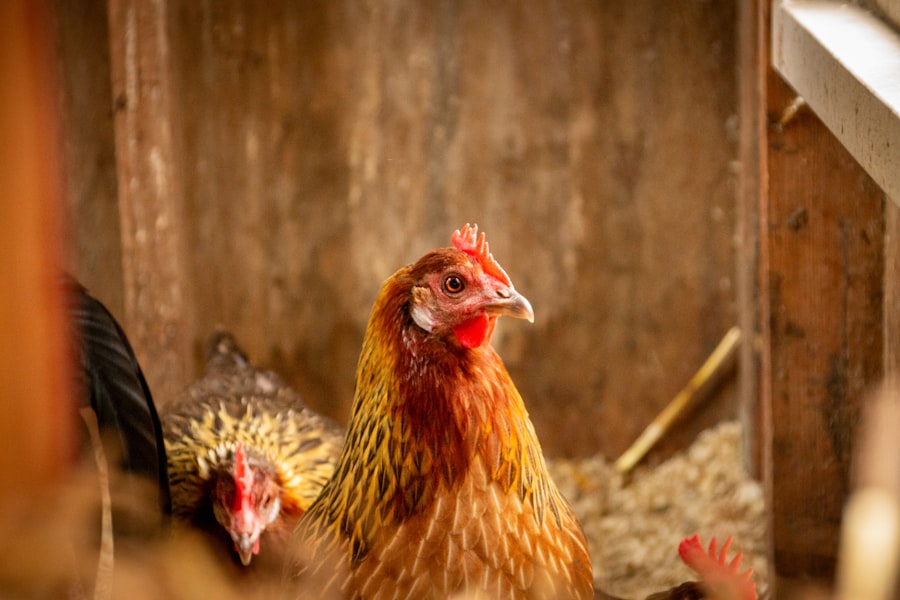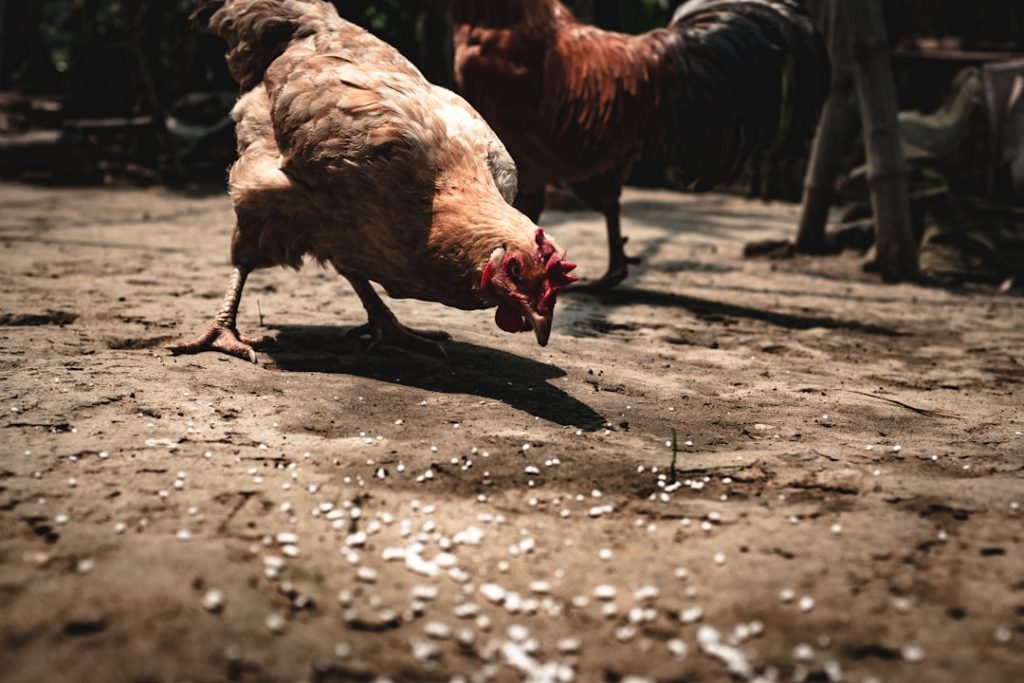Foxes preying on chickens is a persistent challenge for poultry keepers. These predators are renowned for their intelligence and stealthy hunting techniques, posing a significant threat to domestic chickens. The loss of chickens to fox attacks can result in both emotional distress and financial setbacks for owners.
To effectively protect their flocks, chicken keepers must familiarize themselves with fox behavior patterns and implement appropriate preventive measures. These may include various deterrents, physical barriers, and the use of guardian animals. By adopting a comprehensive approach to chicken protection, owners can substantially reduce the risk of fox predation and safeguard their poultry investment.
Table of Contents
Key Takeaways
- Foxes are a common predator of chickens, posing an ongoing problem for poultry owners.
- Understanding the behavior of foxes can help in developing effective strategies for protecting chickens.
- Implementing deterrents and barriers such as fencing and secure coop designs can help keep foxes at bay.
- Utilizing guardian animals like dogs or llamas can provide an added layer of protection for chickens.
- Regular monitoring and adapting of chicken coop setups can help in preventing fox attacks, and seeking professional assistance and advice can be beneficial in dealing with persistent fox predation.
Understanding the behavior of foxes
Accessing Chicken Coops and Enclosures
Foxes are skilled diggers and climbers, making it easy for them to access chicken coops and enclosures. Their ability to dig under or climb over fences and walls allows them to reach their prey undetected.
Territorial Behavior
Foxes are territorial animals that mark their territory and return to familiar areas in search of food. Once they have identified a potential food source, such as a chicken coop, they will continue to return to the area in search of more prey.
Protecting Your Flock
Understanding the behavior of foxes is crucial for chicken owners who want to effectively protect their flock from these predators. By knowing how foxes operate, owners can take necessary measures to secure their chicken coops and enclosures, and prevent foxes from accessing their birds.
Protecting your chickens from foxes

There are several methods and strategies that can be implemented to protect chickens from foxes. One of the most effective ways to protect chickens from fox attacks is by securing the chicken coop and enclosure with sturdy fencing and barriers. This can include burying wire mesh around the perimeter of the coop to prevent foxes from digging underneath, as well as installing a secure roof to prevent them from climbing over.
Additionally, it is important to regularly inspect the coop for any potential entry points or weak spots that could be exploited by foxes. Another important measure is to ensure that the coop is securely locked at night to prevent foxes from gaining access to the chickens while they are roosting. Another effective method for protecting chickens from foxes is by implementing deterrents such as motion-activated lights, sound devices, or sprinkler systems.
These deterrents can startle and discourage foxes from approaching the coop, reducing the risk of an attack. It is also important to keep the area around the coop clear of any potential hiding spots or dense vegetation that could provide cover for foxes. By creating an open and well-lit environment around the coop, chicken owners can make it less appealing for foxes to approach.
Implementing deterrents and barriers
In addition to securing the chicken coop with sturdy fencing and barriers, there are several other deterrents that can be implemented to discourage foxes from approaching the area. Motion-activated lights can startle and deter foxes from approaching the coop, especially during the night when they are most active. Sound devices that emit loud noises or predator calls can also be effective in deterring foxes from the area.
Additionally, sprinkler systems that are triggered by motion can startle and discourage foxes from approaching the coop. It is also important to keep the area around the coop clear of any potential hiding spots or dense vegetation that could provide cover for foxes. By creating an open and well-lit environment around the coop, chicken owners can make it less appealing for foxes to approach.
Regularly trimming back vegetation and keeping the area clean and tidy can help reduce the risk of fox attacks.
Utilizing guardian animals
Another effective method for protecting chickens from foxes is by utilizing guardian animals such as dogs or geese. Dogs are natural predators of foxes and can provide an added layer of protection for the flock. By keeping a dog that is trained to protect chickens in the vicinity of the coop, chicken owners can deter foxes from approaching the area.
Geese are also known for their aggressive nature and can be effective at deterring foxes from approaching the coop. Their loud honking and territorial behavior can discourage foxes from getting too close to the chickens. In addition to dogs and geese, other guardian animals such as llamas or donkeys can also be effective at protecting chickens from fox attacks.
These animals are naturally protective and territorial, making them effective at deterring predators from approaching the coop. By introducing guardian animals into the vicinity of the coop, chicken owners can provide an added layer of protection for their flock.
Monitoring and adapting your chicken coop setup

Regular Coop Inspections
As a chicken owner, it is crucial to regularly monitor your chicken coop setup and make adjustments as needed to ensure the safety of your flock. This includes regularly inspecting the coop for any potential entry points or weak spots that could be exploited by foxes.
Securing the Coop
In addition to regular inspections, it is essential to ensure that the coop is securely locked at night to prevent foxes from gaining access to the chickens while they are roosting.
Monitoring the Surrounding Area
It is also vital to monitor the surrounding area for any signs of fox activity. This can include looking for tracks, scat, or other evidence of fox presence near the coop. By staying vigilant and monitoring the area for any potential threats, chicken owners can take proactive measures to protect their flock from fox attacks.
Seeking professional assistance and advice
In some cases, despite best efforts, foxes may continue to pose a threat to chickens despite deterrents and protective measures. In such instances, it may be necessary to seek professional assistance and advice. Wildlife experts or pest control professionals may be able to provide additional insight and guidance on how to effectively deter foxes from approaching the coop.
Professional assistance may also be necessary if there is evidence of a persistent or aggressive fox presence near the coop. In such cases, it may be necessary to implement more advanced deterrents or trapping methods to remove the threat posed by foxes. By seeking professional assistance and advice, chicken owners can ensure that they are taking all necessary measures to protect their flock from predators.
In conclusion, protecting chickens from foxes requires a combination of understanding their behavior, implementing deterrents and barriers, utilizing guardian animals, monitoring and adapting the chicken coop setup, and seeking professional assistance when necessary. By taking proactive measures and staying vigilant, chicken owners can minimize the risk of fox attacks and ensure the safety and well-being of their flock.
If you’re struggling with foxes getting into your chicken coop, you may want to consider upgrading your coop security. Poultry Wizard has a helpful article on chicken coop security in Chester, SC that offers tips and advice on how to keep your chickens safe from predators like foxes.
FAQs
What are some common signs that a fox is targeting my chickens?
Some common signs that a fox is targeting your chickens include finding feathers scattered around the coop or yard, seeing paw prints near the chicken coop, and noticing a decrease in the number of chickens.
How can I protect my chickens from foxes?
You can protect your chickens from foxes by securing the chicken coop with sturdy fencing, using motion-activated lights or sound devices to deter foxes, and keeping the area around the coop free of potential hiding spots for foxes.
What should I do if I suspect a fox is targeting my chickens?
If you suspect a fox is targeting your chickens, you should take immediate action to secure the chicken coop and consider contacting local wildlife authorities for assistance in safely removing the fox from your property.
Are there any natural deterrents for foxes?
Some natural deterrents for foxes include using strong-smelling substances like vinegar or predator urine around the perimeter of the chicken coop, as well as planting prickly bushes or installing motion-activated sprinklers to discourage foxes from approaching.
Is it legal to trap or kill foxes that are targeting my chickens?
Laws regarding trapping or killing foxes vary by location, so it’s important to check with local wildlife authorities to determine the legality of taking action against foxes on your property. In some areas, permits may be required for trapping or killing foxes.
Meet Walter, the feathered-friend fanatic of Florida! Nestled in the sunshine state, Walter struts through life with his feathered companions, clucking his way to happiness. With a coop that’s fancier than a five-star hotel, he’s the Don Juan of the chicken world. When he’s not teaching his hens to do the cha-cha, you’ll find him in a heated debate with his prized rooster, Sir Clucks-a-Lot. Walter’s poultry passion is no yolk; he’s the sunny-side-up guy you never knew you needed in your flock of friends!







